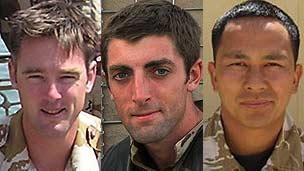Rogue Afghan attack was 'unlawful killing'
- Published

Maj James Joshua Bowman, Lt Neal Turkington and Cpl Arjun Purja Pun were killed in July 2010
Three soldiers were unlawfully killed by a rogue Afghan soldier in Helmand in July 2010, an inquest has ruled.
Maj James Bowman, Lt Neal Turkington and Cpl Arjun Purja Pun died in a suspected premeditated attack by an Afghan National Army member.
Maj Bowman was shot as he slept. His comrades were shot in their command centre, where four others were injured.
The inquest in Trowbridge, Wiltshire, concluded that there was no evidence of failure to properly protect the men.
Wiltshire coroner David Ridley said: "I am satisfied that all three were killed as a result of the actions of the member of the Afghan National Army (ANA)."
The inquest heard that Sgt Talib Hussein, 23, of the ANA, shot Maj Bowman, 34, from Salisbury, Wiltshire, dead in his sleeping quarters in Patrol Base 3 (PB3) in Nahr-e Saraj district, near Helmand's capital, Lashkar Gah.
Using an Afghan-issue light machine gun, an M16 rifle and a grenade launcher, he then fired into the base's command centre, killing Lt Turkington, 26, from Craigavon, Northern Ireland, and Cpl Pun, 33, from Nepal, before escaping.
Post-mortem examinations found all three soldiers had died from gunshot wounds, the inquest was told.
'No apparent risk'
Mr Ridley accepted the Army had a duty to protect those on the base under the European Convention for Human Rights but said he saw no evidence it had failed to do so.
"One must guard against hindsight," he said.
"In this case the possibility of an ANA attack was known but it was never perceived at any level, either by those based at PB3 or higher up, as a real risk, an actual risk."
Speaking of Hussein, Mr Ridley said: "The general perception was that he was a quiet individual but (he) had the respect of those with the International Security Assistance Force (Isaf)."
He was one of the better members of the ANA, with nothing to suggest he posed a safety risk, the coroner said.
After the inquest, Lt Turkington's father, Ivor, said he was pleased at the judge's acknowledgement of the Army's duties in relation to the human rights of personnel on bases outside the UK.
The Northern Ireland Human Rights Commission had backed him in raising the point.
Its director Virginia McVea said the ruling would have a "major impact" on future inquests.
"It ensures a fuller investigation where there is a suggestion of systemic failures to protect soldiers' lives," she said.
Brig Richard Felton, then commander of Taskforce Helmand, had told the inquest that his main concern was the "thousands and thousands" of attacks on bases from insurgent forces.
Jonathan Laidlaw QC, representing the family of Lt Turkington, told the brigadier they were concerned that no steps had been taken prior to the attack to prepare the troops for the threat from ANA soldiers.
Brig Felton said: "There was no evidence for the threat. We had been living cheek-by-jowl with the ANA for four years with no incident."
'No barriers'
He said the relationship between the British troops and their ANA counterparts depended on trust.
"If you are facing real and present danger then you have to have that trust and you do not build up that trust by putting up physical barriers where it's not appropriate."
Lt Col Gerald Strickland: "I relied on all of these men"
Nothing suggested that Hussein was a member of the Taliban who had infiltrated the ANA, the inquest heard.
However, after the killings, a man calling himself Talib Hussein contacted the BBC bureau in Kabul to claim he carried out the killings, saying he had been angry at the conduct of British troops and that he had acted alone.
He said he had joined the Taliban after the attack.
Capt Peter Houlton-Hart told the Trowbridge inquest he thought Talib Hussein may have been threatened with retribution if he did not carry out the attack.